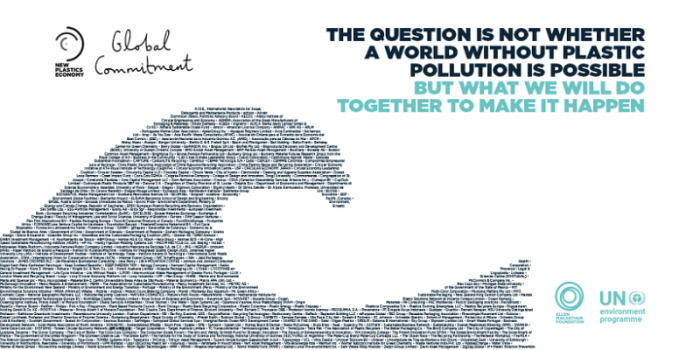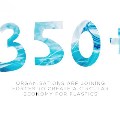If this is your company, CONTACT US to activate Packbase™ software to build your portal.


GENEVA, 24 October 2019 – The Ellen MacArthur Foundation and the UN Environment Programme today released their New Plastics Economy Global Commitment – 2019 Progress Report. This report offers unprecedented transparency and sets a clear baseline for measuring progress towards a circular economy for plastic. The Foundation welcomes the promising early progress made by the signatories towards eliminating problematic plastic packaging and to increasing the use of recycled plastic more than five-fold by 2025. However, it also calls for more action to eliminate and reuse, for innovation to make all plastic packaging 100% reusable, recyclable or compostable, and for efforts to circulate plastics to avoid waste and pollution.
For the first time, the report sets out the progress made by the almost 200 businesses and governments who signed the New Plastics Economy Global Commitment, directly alongside their original commitments. It includes key data such as the volumes of plastic packaging used and the proportion of it that is recycled. The progress made in these areas demonstrates that L’OCCITANE en Provence, one of the signatory companies, is well on its way to tackling plastic pollution at source.
Sander Defruyt, New Plastics Economy lead at the Ellen MacArthur Foundation, said: ‘The New Plastics Economy Global Commitment unites businesses, governments and others behind a clear vision of a circular economy for plastic. We are pleased L’OCCITANE en Provence is a signatory, setting concrete 2025 targets. Our vision is for a world where plastic never becomes waste or pollution. It will be a challenging journey, but by coming together we can eliminate the plastics we don’t need and innovate, so the plastics we do need can be safely and easily circulated – keeping them in the economy and out of the environment.’
Sensible sustainable thinking is at the heart of L’OCCITANE. Inspired by the New Plastics Economy Global Commitment’s targets and principle of mutual transparency, L’OCCITANE is one step closer to meeting its vision of achieving a circular economy for plastic. L’OCCITANE has pledged that, by 2025, 100% of its bottles will be made out of 100% recycled plastic, and 100% of its owned stores will offer a recycling service. To achieve this goal, it has set out a number of specific actions in three areas:
Recycle – working towards a circular economy
- In 2009, L’OCCITANE launched its first 100% recycled bottle. The current percentage of recycled plastic in its bottles is 30%, and the brand is determined to transition to 100% sustainable PET plastic in all its bottles by 2025. To reach its goal, L’OCCITANE has partnered with Loop Industries, the industry leader and a technological innovator in sustainable plastic. This partnership represents a significant shift in the brand’s efforts to achieve a circular economy.
- L’OCCITANE is working to increase the proportion of recycled plastic across all its plastic components and packaging to 40% by 2025. The brand plans to grow this figure to 19% over the next 12 months alone. The number of its bottles using recycled plastic will reach 51 during the same time span.
- As early as 2014, the brand launched a partnership with TerraCycle, a company specialising in recycling hard-to-recycle waste. This partnership encourages consumers to recycle, upcycling empty beauty containers to avoid landfill or incineration. It also offers a recycling service in countries Press Release where customers do not have access to recycling as well as the chance to recycle certain packaging that is not accepted at public facilities. Currently, over 40% of L’OCCITANE’s owned stores worldwide offer in-store recycling, and the goal is to expand that to 100% by 2025.
Reduce – reducing waste and improving product lifespans
- The brand’s first eco-refills were launched in 2008. Today, L’OCCITANE offers 16 eco-refills for best-selling products. These eco-refills use up to 90% less plastic than a regular bottle, saving more than 214 tonnes of plastic each year. L’OCCITANE intends to offer 25 eco-refills by 2022, while also making the eco-refill packaging itself recyclable by 2025.
- In-store refill stations for shower gel are currently tested in some L’OCCITANE stores in Spain and Germany, allowing customers to fill reusable bottles indefinitely. The company aims to expand bulk dispensers to more countries and stores in 2020. L’OCCITANE has also started replacing cellophane protective seals with a new, eco-friendly and compostable solution made from FSC-certified wood fibre.
- The brand has never used plastic bags in its stores and has a policy of not using plastic cups, straws or cotton buds. L’OCCITANE will phase out plastic spatulas from its cream products by 2021, and progressively remove or substitute plastic components from e-commerce shipping boxes.
React – supporting initiatives that encourage responsible and sustainable use of plastic
- L’OCCITANE is the main partner of the Plastic Odyssey expedition. Beginning in 2020, a vessel powered by plastic waste will sail along the most polluted coasts of Latin America, Africa and Asia. On its way, it will collect plastic waste, sort it and recycle it on board. The expedition aims to raise awareness about recycling and share recycling technologies throughout the world, with the ultimate goal of creating a future for plastic waste so it becomes a source of income for the most disadvantaged.
- In 2018, L’OCCITANE joined SPICE, the Sustainable Packaging Initiative for CosmEtics. SPICE is an initiative that brings together organisations in the cosmetics industry to work towards a common goal: to collectively shape the future of sustainable packaging.
















